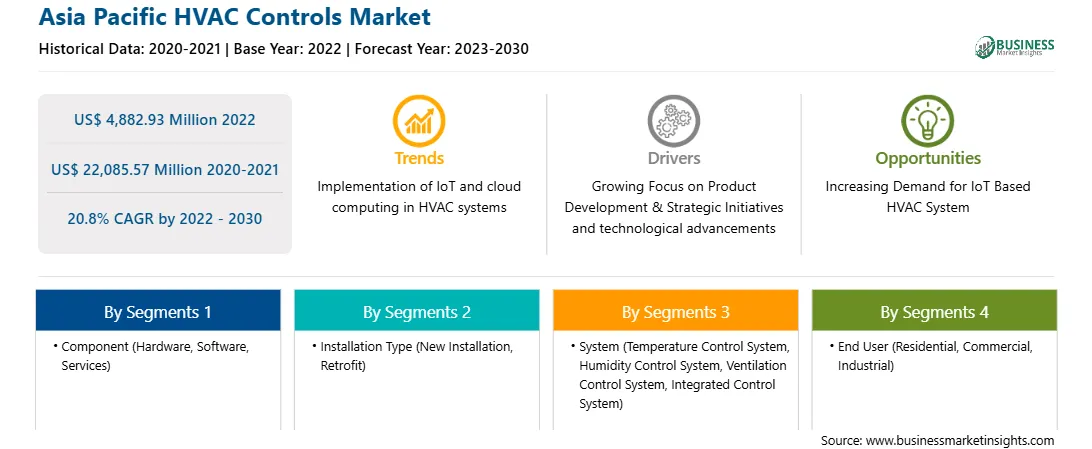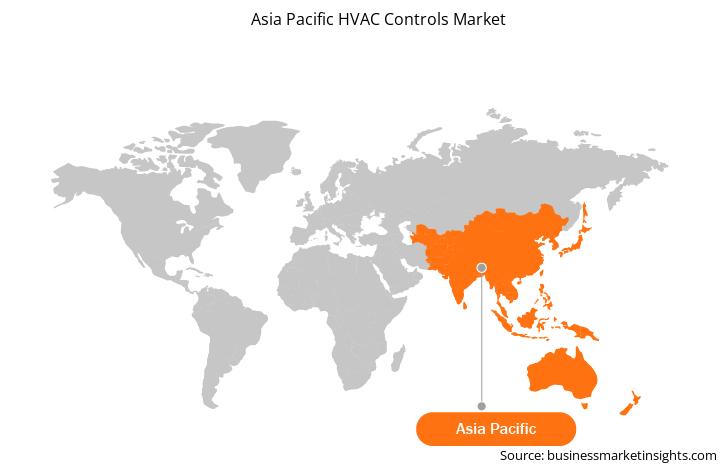Various governments across the world are taking initiatives to develop smart cities in their respective economies due to the rising trend of urbanization. In 2021, under the smart city initiative in Singapore, the government announced to build 42,000 homes connected to a single central air conditioning unit. Moreover, the Indian government launched Smart Cities Mission in 2015 to promote sustainable and inclusive cities that offer essential infrastructure and a decent quality of life, with a sustainable and clean environment and application of 'Smart' solutions. The government initiatives toward green and smart cities are adding impetus to the HVAC industry across the world for the development of energy-efficient and economical HVAC systems. This has shifted the focus of HVAC market players toward the developing markets, thereby creating regional clusters for HVAC equipment manufacturing. Therefore, the increasing focus of governments worldwide on the development of smart cities is expected to create lucrative opportunities for the Asia Pacific HVAC controls market during the forecast period.
The Asia Pacific HVAC controls market is segmented into China, India, Japan, Australia, South Korea, and the Rest of Asia Pacific. The unpredictable weather and rising temperatures have encouraged consumers to adopt HVAC control systems. HVAC systems also improve the visual value of commercial and residential spaces. Several companies provide appealing products to customers, allowing them to select from various designs. The advent of cutting-edge designs and the altering preferences of consumers are anticipated to boost the demand for HVAC controls.
Asia Pacific also has the world's fastest economic growth rates. The expansion of the heavy construction sector due to population growth and rising per capita disposable income will benefit the APAC construction industry. The increased construction operations in China, India, and several other nations in Asia Pacific will also fuel the deployment of HVAC controls, thereby favoring the overall market outlook. The existence of businesses offering inexpensive equipment in China and neighboring countries is significantly driving the development of Asia Pacific HVAC controls market. The rapid urbanization of developing nations such as China, India, and Japan have empowered people to embrace more opulent lifestyles, thereby increasing the need for HVAC control systems. The increasing partnerships between regulatory authorities and businesses in the industry to raise awareness about the star-labeled HVAC units will most likely offer lucrative opportunities to the APAC HVAC controls market. Moreover, several organizations have launched initiatives and programs to encourage the use of sophisticated energy-efficient components in new building structures. For instance, in July 2021, Johnson announced three landmark partnerships with companies in Asia Pacific to help meet their environmental, social and governance (ESG) goals as well as net zero carbon commitments.
Strategic insights for the Asia Pacific HVAC Controls provides data-driven analysis of the industry landscape, including current trends, key players, and regional nuances. These insights offer actionable recommendations, enabling readers to differentiate themselves from competitors by identifying untapped segments or developing unique value propositions. Leveraging data analytics, these insights help industry players anticipate the market shifts, whether investors, manufacturers, or other stakeholders. A future-oriented perspective is essential, helping stakeholders anticipate market shifts and position themselves for long-term success in this dynamic region. Ultimately, effective strategic insights empower readers to make informed decisions that drive profitability and achieve their business objectives within the market.

| Report Attribute | Details |
|---|---|
| Market size in 2022 | US$ 4,882.93 Million |
| Market Size by 2030 | US$ 22,085.57 Million |
| Global CAGR (2022 - 2030) | 20.8% |
| Historical Data | 2020-2021 |
| Forecast period | 2023-2030 |
| Segments Covered |
By Component
|
| Regions and Countries Covered | Asia-Pacific
|
| Market leaders and key company profiles |
The geographic scope of the Asia Pacific HVAC Controls refers to the specific areas in which a business operates and competes. Understanding local distinctions, such as diverse consumer preferences (e.g., demand for specific plug types or battery backup durations), varying economic conditions, and regulatory environments, is crucial for tailoring strategies to specific markets. Businesses can expand their reach by identifying underserved areas or adapting their offerings to meet local demands. A clear market focus allows for more effective resource allocation, targeted marketing campaigns, and better positioning against local competitors, ultimately driving growth in those targeted areas.

The Asia Pacific HVAC controls market is segmented into component, installation type, system, end user, and country.
Based on component, the Asia Pacific HVAC controls market is bifurcated into hardware and software & services. In 2022, the hardware segment registered a larger share in the Asia Pacific HVAC controls market. The hardware segment is further segmented into sensor, controllers, smart vents, and others.
Based on installation type, the Asia Pacific HVAC controls market is bifurcated into new installation and retrofit. In 2022, the retrofit segment registered a larger share in the Asia Pacific HVAC controls market.
Based on system, the Asia Pacific HVAC controls market is segmented into temperature control system, humidity control system, ventilation control system, and integrated control system. In 2022, the temperature control system segment registered the largest share in the Asia Pacific HVAC controls market.
Based on end user industry, the Asia Pacific HVAC controls market is segmented into residential, commercial, and industrial. In 2022, the commercial segment registered the largest share in the Asia Pacific HVAC controls market.
Based on country, the Asia Pacific HVAC controls market is segmented into China, Japan, South Korea, India, Australia, and the Rest of Asia Pacific. In 2022, China registered the largest share in the Asia Pacific HVAC controls market.
Carrier Global Corporation; DAIKIN INDUSTRIES, Ltd.; Acuity Brands, Inc.; Emerson Electric Co.; Honeywell International Inc.; Johnson Controls, Inc.; Schneider Electric SE; Siemens AG; and Lennox International Inc. are some of the leading companies operating in the Asia Pacific HVAC controls market.
The Asia Pacific HVAC Controls Market is valued at US$ 4,882.93 Million in 2022, it is projected to reach US$ 22,085.57 Million by 2030.
As per our report Asia Pacific HVAC Controls Market, the market size is valued at US$ 4,882.93 Million in 2022, projecting it to reach US$ 22,085.57 Million by 2030. This translates to a CAGR of approximately 20.8% during the forecast period.
The Asia Pacific HVAC Controls Market report typically cover these key segments-
The historic period, base year, and forecast period can vary slightly depending on the specific market research report. However, for the Asia Pacific HVAC Controls Market report:
The Asia Pacific HVAC Controls Market is populated by several key players, each contributing to its growth and innovation. Some of the major players include:
The Asia Pacific HVAC Controls Market report is valuable for diverse stakeholders, including:
Essentially, anyone involved in or considering involvement in the Asia Pacific HVAC Controls Market value chain can benefit from the information contained in a comprehensive market report.